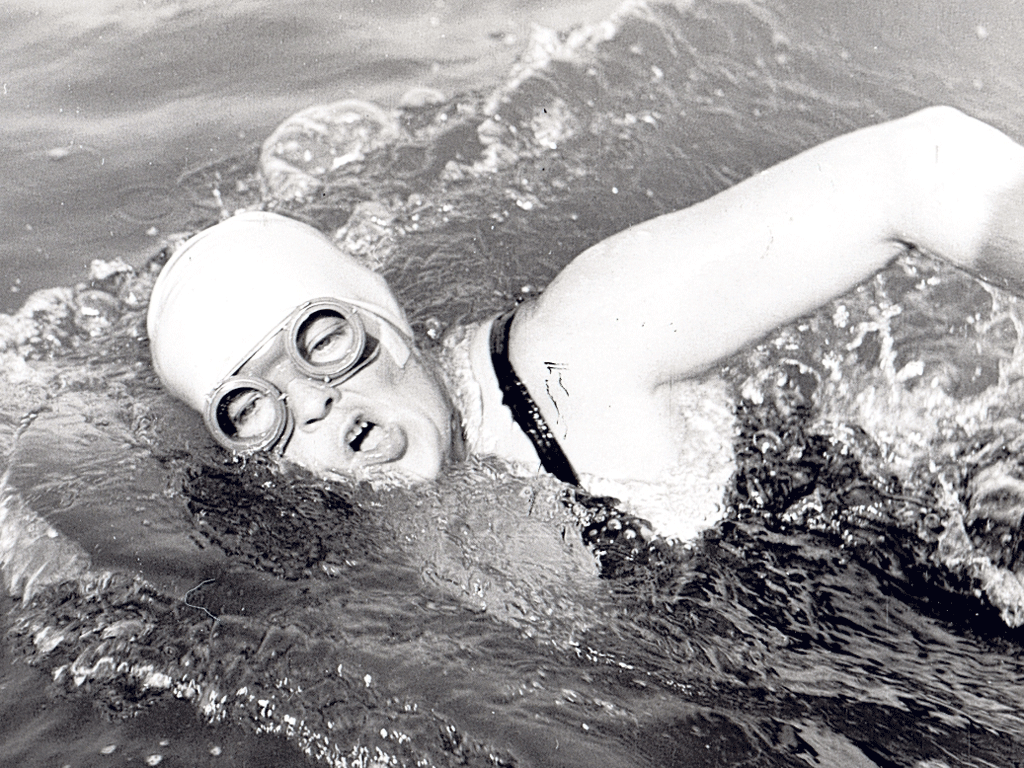Willy van Rysel: Long-distance swimming pioneer

During an interview for Swimming Times magazine in 2003, Willy van Rysel announced matter-of-factly: "I came to Britain in 1948 and was pursued by the paparazzi every day." The paparazzi? Sensing my scepticism, she produced the evidence – a sheaf of press pictures including one showing a gaggle of photographers snapping the would-be Channel swimmer as she left her hotel at Dover.
Channel swimming was still rare in the post-war years and van Rysel's plans made headlines. She made her attempt in 1949 and had she succeeded, she would have become only the ninth woman to complete the crossing and the first for 10 years. Through no fault of her own, the France-to- England attempt ended minutes from success when her escort boat hit the wall of Dover harbour in dense fog. In the ensuing confusion, van Rysel was ordered to leave the water.
"I was still feeling fit and we were just 500 yards from the beach," she recalled years later. "After all that training and effort, it was my greatest disappointment." It was, however, one of very few disappointments in a swimming career that was to span six decades.
Unusually for an accomplished sportsperson, van Rysel (born Wilhemina van Rijsel) had neither coaching nor encouragement. In an early manifestation of the forthright and uncompromising nature that became evident to everyone who knew her, she taught herself to swim in the sea in her native Netherlands at the age of seven, then pursued her passion in secret because her parents considered it improper for a girl to be seen in a swimsuit. Banned from even owning a costume, she swam in a vest held together at the bottom by a safety pin. In later years she spent her pocket money on watching international swimmers and worked to emulate their techniques. She entered her first race at 17 and won.
After the war, van Rysel became a leading open water swimmer, completing more than 100 lake, sea and river swims in Europe and North America and breaking records in many. Her 24km crossing of Ysel Lake in the Netherlands in 1948 was the first by a woman and the fastest by anyone. In 1950 she became first person to swim the 12 miles from Dungeness to Hythe and the same year she completed the 17 miles from Dover to Ramsgate in a record 5hr 15min. She broke the 10.5-mile Windermere record in 1951 and again in 1955.
Van Rysel was one of only a few swimmers to be inducted into both the International Swimming Hall of Fame (ISHOF) and the International Marathon Swimming Hall of Fame. In 1973 she became the first woman to receive the ISHOF's Davids-Wheeler Award for her "outstanding contribution to long distance swimming".
Van Rysel also played water polo, gave demonstrations of springboard diving and in 1953 coached a team of 16 women and two boys for a water ballet show marking the Coronation. She had a major hand in introducing synchronised swimming to Britain in the 1950s after watching a demonstration by the great American swimmer, Beulah Gundling.
Her greatest legacy, however, centres on her characteristically dogged 1970s campaign for the introduction of "masters" swimming – competitive swimming for adult age groups. "In those days when you were 25 you were a cast-off," she recalled in 2003. "I thought something had to be done for older swimmers who wanted to continue in the sport."
She began with the British Long Distance Swimming Association, who responded in 1968 by introducing a "veterans" category for women over 40 and men over 45. Meanwhile, masters swimming was now well-established in North America and van Rysel began badgering the Amateur Swimming Association to introduce five-year age groups for over-25s.
"I encountered a lot of resistance and wore out my typewriter writing to the ASA," she recalled. "I knew the times the American and Canadian masters were doing and I knew I could break world records. But I had to go abroad to break records, which didn't seem right."
The correspondence went on for years but in 1981 the ASA hosted Britain's first national masters championships. Irritatingly for van Rysel, by then 65, the five-year age bands stopped at 60-plus so she found herself competing against younger women in an open-ended age group. As masters swimming grew during the 1980s, however, older age groups were created to meet demand.
For the next 26 years, van Rysel competed regularly at national and international masters competitions, amassing so many trophies, medals and certificates that they occupied a whole room in her Bournemouth flat. She also broke literally hundreds of records and, uniquely, set world records in seven masters age groups – from 60-64yrs to 90-94yrs. A spinal problem forced her to retire from the pool aged 91 but at the time of her death in a Bournemouth nursing home she still held two world, 22 European and 33 British masters records.
The third of van Rysel's four husbands was the water polo Olympian and first two-way Channel swimmer Ted Temme. Her fourth husband, the eye surgeon Ronald Vaughan-Jones, died 18 years ago.
Wilhemina Magdalena van Rijsel (Willy van Rysel), swimmer: born, Amsterdam, the Netherlands 30 July 1916; married four times; third husband Ted Temme (married 1950, divorced 1961); fourth husband Ronald Vaughan-Jones (died c1994); died Bournemouth 19 September 2012.
Subscribe to Independent Premium to bookmark this article
Want to bookmark your favourite articles and stories to read or reference later? Start your Independent Premium subscription today.

Join our commenting forum
Join thought-provoking conversations, follow other Independent readers and see their replies